Chilcot report: What to look out for
- Published
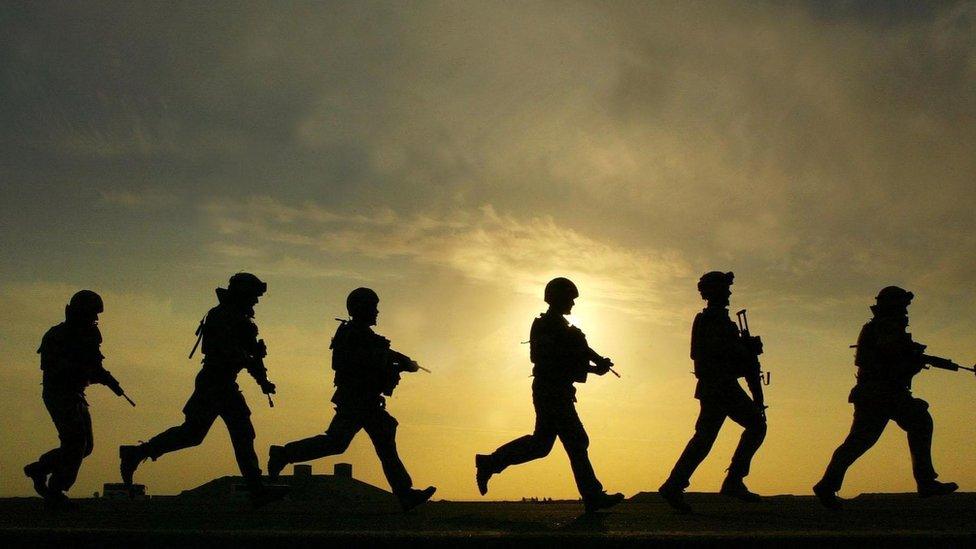
The long-awaited Chilcot report on the Iraq war is due to be published on Wednesday, seven years after it was first commissioned by former Prime Minister Gordon Brown.
The aim of Sir John Chilcot's wide-ranging Iraq Inquiry, external was to identify lessons to be learned from the invasion of Iraq, which ran from 20 March to 1 May 2003 and the aftermath up to the end of July 2009. What are the things to look out for in the report?

Tony Blair
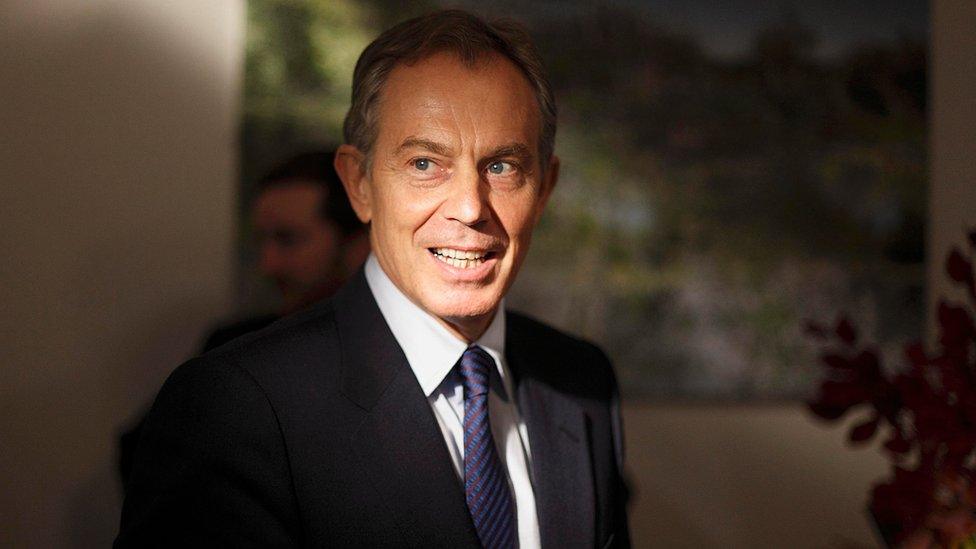
Since leaving office Tony Blair has spent most of his time working on the Middle East
As prime minister, Tony Blair was instrumental in making the decision to take the UK to war in Iraq. He has faced criticism of this ever since - with some even calling for him to be prosecuted as a war criminal.
Setting out the case for war in the UK's 2002 dossier, external, he wrote in the foreword that intelligence had "established beyond doubt" that Saddam Hussein was producing chemical and biological weapons.
But much of this has since been shown to be incorrect, external and Mr Blair has faced enduring criticism over the UK's role in the conflict, which led to the deaths of 179 UK military personnel. and hundreds of thousands of Iraqis.
In a report, external published in 2004 into the use of intelligence used to justify war, ex-cabinet secretary Lord Butler found the intelligence used was unreliable, but the report did not name individuals as being responsible for these flaws.
Of particular interest to the Iraq Inquiry will be the 29 memos between Mr Blair and then US President George W Bush, sent during 2000-2003. They will shine a light on the extent of the relationship between the two leaders and may help reveal what - if any - influence the US president had, external over the prime minister's desire for war.
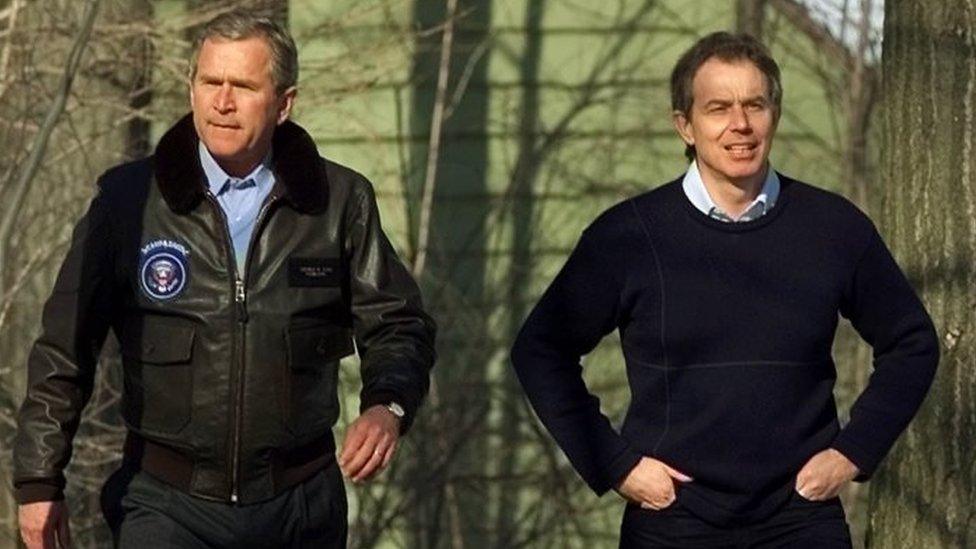
Tony Blair visited Camp David, the US president's country retreat, for talks with George W Bush

Alastair Campbell
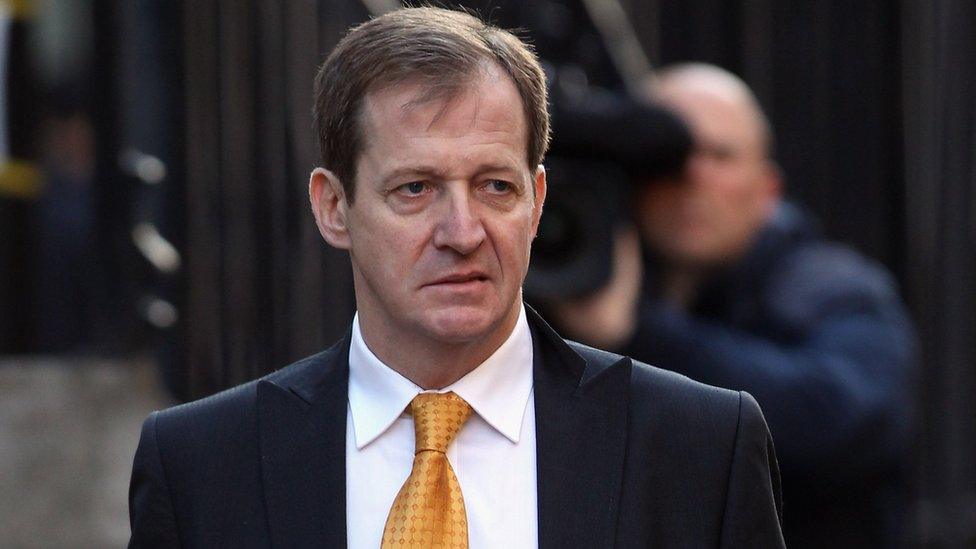
Alastair Campbell told the Iraq Inquiry that parts of the 2002 dossier could have been "clearer" but did not "misrepresent" Iraq's threat
As Tony Blair's former spokesman and key government "spin doctor" Alastair Campbell's role will also come under scrutiny.
He played a key role in drawing-up the government's September 2002 dossier on Iraq's alleged weapons of mass destruction, containing the claim that they could be deployed within 45 minutes.
After the invasion, a controversial BBC report claimed that Downing Street knew this claim was incorrect but had used it to "sex up" the dossier. Dr David Kelly, external, a government weapons expert thought to be the source of this report, was found dead two days after being questioned by MPs.
His death resulted in an inquiry led by Lord Hutton, external which found that the allegation that the dossier was embellished with intelligence known to be unreliable was unfounded.
Mr Campbell has said he "defends every single word", external of the 2002 document.
During his evidence to the Iraq Inquiry, Mr Campbell said he had provided "presentational" support on the key September 2002 dossier but Downing Street did not try to "beef up or over-ride" the judgements of the intelligence agencies.
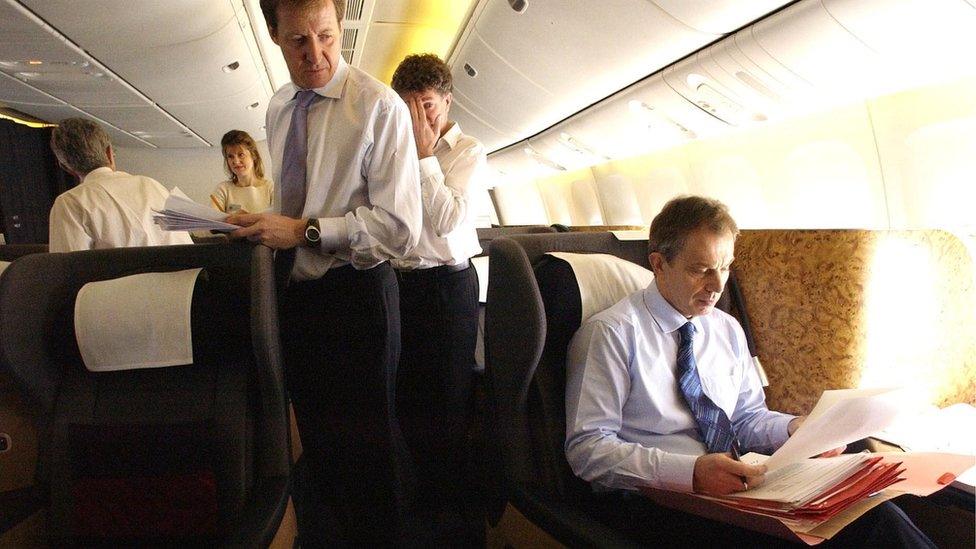
Alastair Campbell was at the heart of government during Tony Blair's time as prime minister

Jack Straw
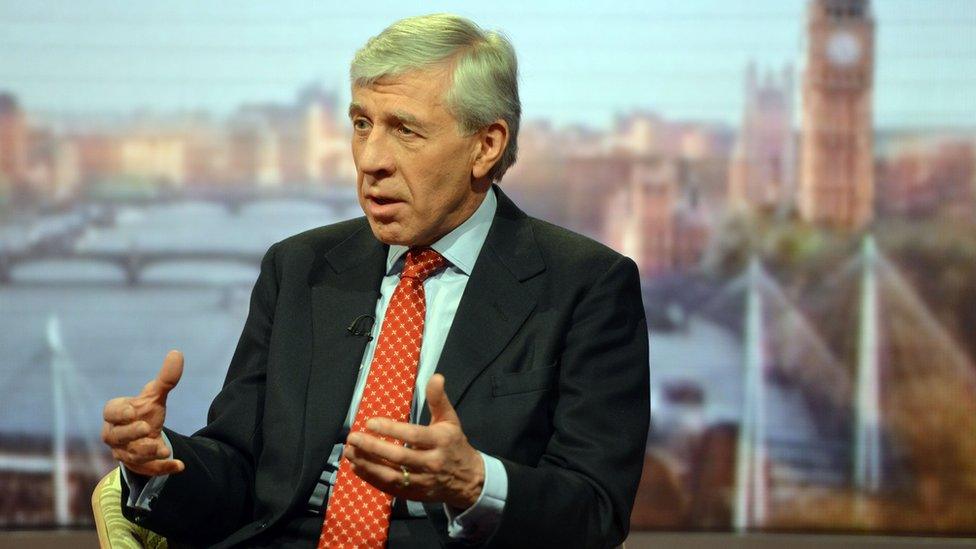
Jack Straw told the Iraq Inquiry how he had agonised over going to war
Jack Straw served as foreign secretary in Tony Blair's cabinet during the Iraq war.
He has spoken of how he feels the invasion was justified, external, and giving evidence to the Iraq Inquiry in 2010 he defended his decision to reject advice from senior Foreign Office legal officers in the run-up to the war. He said there were "different views", but the ultimate decision had rested with the then attorney general Lord Goldsmith.
He also said if he had opposed the war the UK would not have taken part., external
But former UN weapons inspector Hans Blix said Mr Straw gave some incorrect answers, external during his evidence to the Chilcot inquiry.
Mr Blix said Mr Straw had been incorrect to suggest, in 2002, that UN weapons inspectors were not being allowed access to certain sites.
"I'm puzzled by some of the things Jack Straw said," Mr Blix told BBC World News's Hardtalk programme.
More recently Mr Straw has spoken of his "regret". He said that while he felt that the decision made at the time was right that "the whole basis on which we went to war turned out to be wrong".
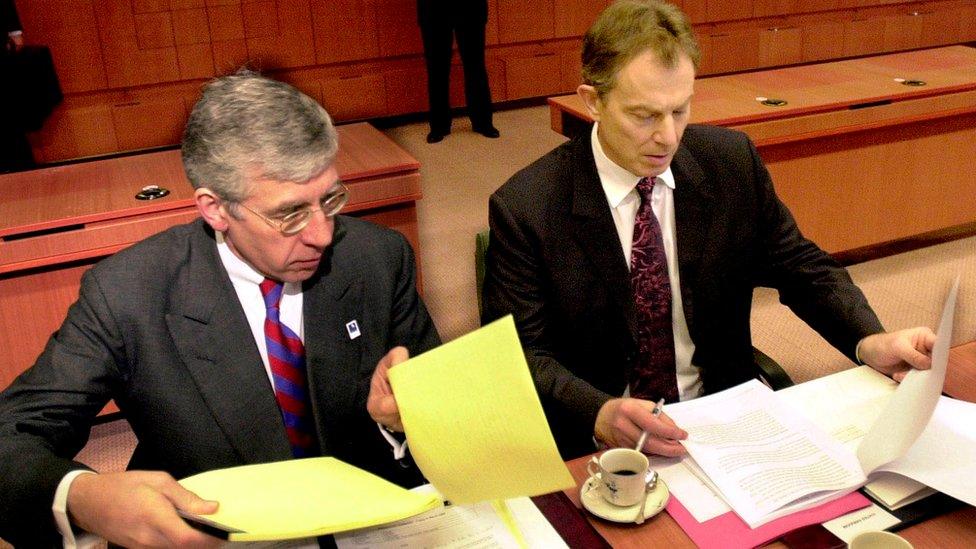
Jack Straw is seen with Tony Blair the day after UK and US forces entered Iraq

Intelligence dossiers
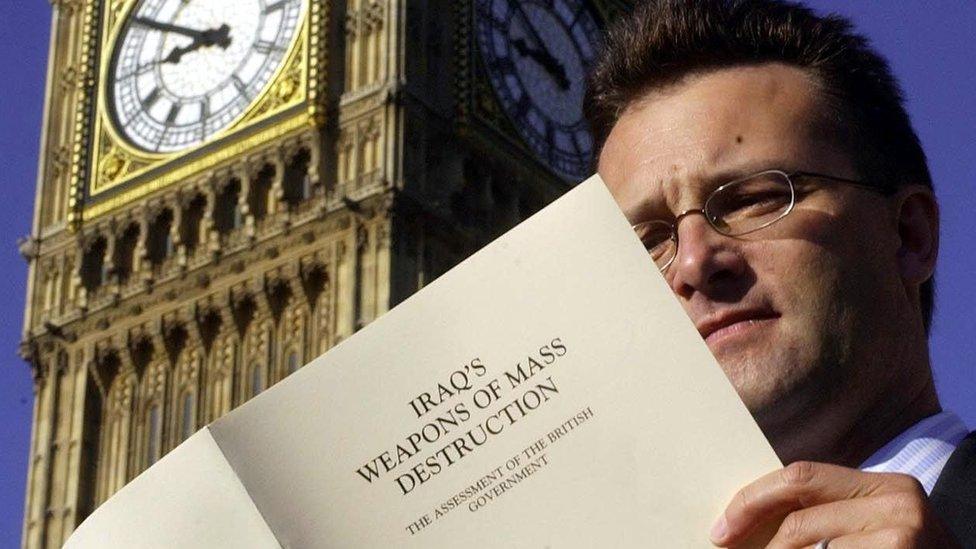
The 2002 dossier had a foreword from Tony Blair stating that he was "in no doubt" that the threat posed by Saddam Hussein was "serious and current"
In the run-up to the invasion, the UK government published two dossiers giving the case against Saddam Hussein. These documents have been subject to debate ever since.
Mr Blair published the first dossier in September 2002, external, setting out the case for war.
It claimed Iraq had a continuing programme of chemical and biological weapons, had tried to acquire nuclear material from Africa and - its key point - claimed Iraq could launch an attack within 45 minutes.
In a foreword, Mr Blair wrote: "I am in no doubt that the threat is serious and current, that he has made progress on WMD and that he has to be stopped."
Key intelligence used in the 2002 dossier was found by the 2004 Butler Report, external to be unreliable.
The second dossier, published in February 2003,, external was heavily criticised after it emerged that it included parts which were plagiarised from a US student's thesis and were 12 years out of date.
In June 2003 it emerged the government wrote to the intelligence and security services admitting there were failings, external in the information used in the 2003 dossier.
Then Home Secretary David Blunkett said, external the government should never have published the second document.
Former chief UN weapons inspector, Hans Blix, has previously accused the British government of using spin in its second dossier on Iraq's weapons of mass destruction, talking of a "culture of spin, of hyping".

Military equipment failings
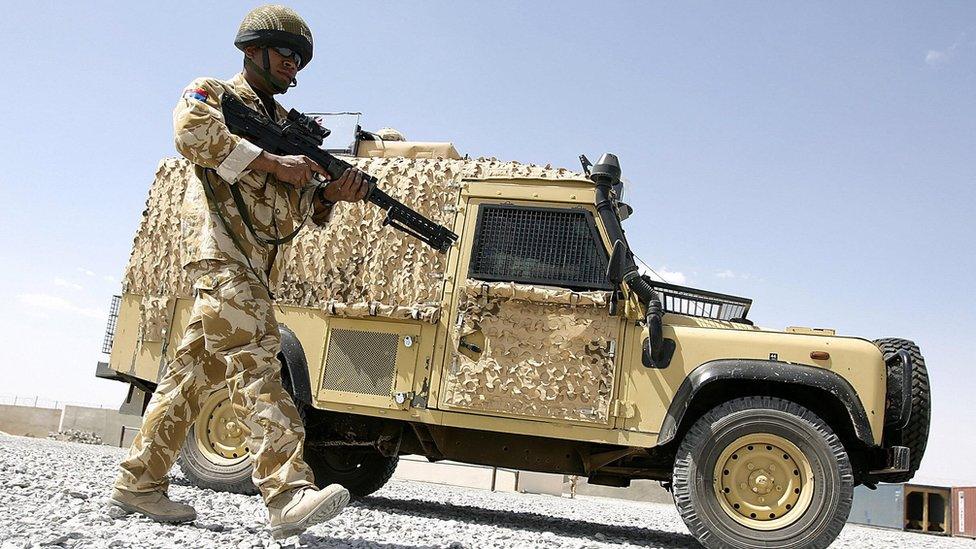
Twenty-seven soldiers died while in Snatch Land Rovers
During the evidence hearings, the inquiry was told by Air Chief Marshal Sir Jock Stirrup,, external then head of the UK's armed forces, that British troops in Iraq did not have sufficient body armour because the military "simply didn't have enough time" to source all the necessary equipment.
During the fighting there were instances of equipment shortages proving fatal.
Sgt Steven Roberts,, external of Shipley, West Yorks, was the first British soldier killed in action in Iraq after being accidentally shot dead when UK troops opened fire during a disturbance near Basra in March 2003.
An Army report found that he had to give up his enhanced body armour because of shortages, four days before his death. The soldier's widow Samantha Roberts later released an audio diary in which her husband had called supplies to soldiers "a joke".
Other families of soldiers killed in Iraq have also criticised equipment shortages.
The coroner at an inquest into the deaths of six soldiers of the Royal Military Police, external, killed by a mob at a police station in Iraq, said they should have been better equipped.
The father of L/Cpl Tom Keys said their deaths had been caused by "negligence".
Reg Keys told the inquest, external: "What the family are looking for is to find out why six men found themselves in a police station, without communications and having been descaled, in a hostile town and with no assistance."
There were further problems with Snatch Land Rovers, with 27 soldiers being killed while using the vehicles.
The thin-skinned vehicles, designed to withstand small arms fire, were said by MPs, military personnel and the families of dead soldiers to offer insufficient protection against roadside bombs, external.

Lord Goldsmith and the legality of war
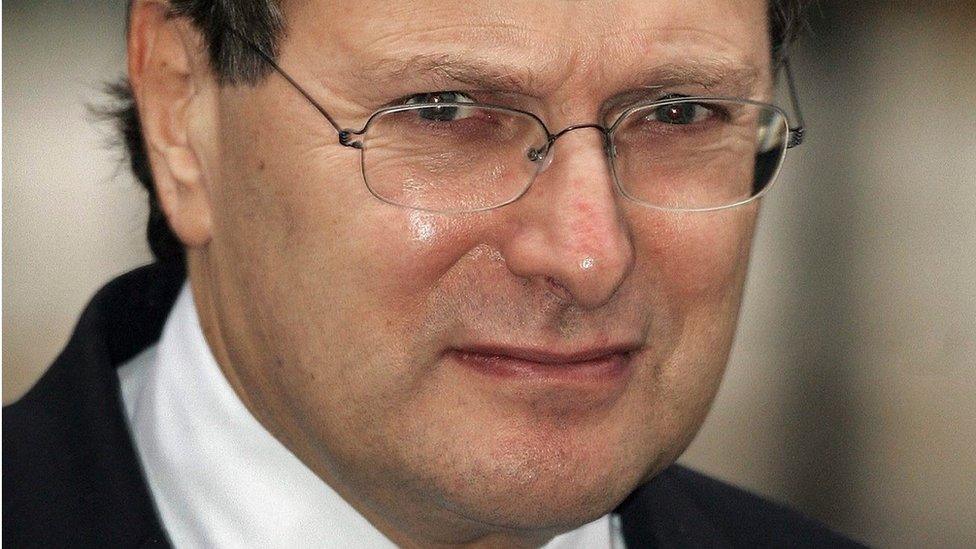
Lord Goldsmith told the inquiry that the military deserved an "unequivocal" judgement on the legality of its actions before going into battle
Former attorney general Lord Goldsmith's advice to Tony Blair on the legality of going to war in Iraq was crucial.
Until a month before the 2003 invasion, he believed it would be unlawful to invade Iraq without a further United Nations Security Council resolution.
But he changed his mind a month later after being persuaded to talk to senior US government lawyers and Britain's ambassador to the UN, Sir Jeremy Greenstock. He eventually gave the "green light" for an invasion after deciding force was justified by UN accords on Iraq dating back to 1991.
In 2010 Lord Goldsmith told the Iraq Inquiry, external it was "complete nonsense" that he had changed his mind because of political pressure.
UK and US troops had massed on Iraq's borders as a result of the UN Security Council unanimously passing resolution 1441, external on 8 November 2002, which gave Iraq "a final opportunity to comply with its disarmament obligations" and warned Iraq of "serious consequences" if it did not.
On 24 February 2003, the UK and the US attempted to persuade the Security Council to pass a further resolution authorising the use of force. On 7 March 2003 weapons inspector Hans Blix told the UN that Iraq had taken significant steps to comply with its disarmament obligations, but said there were still unanswered questions.
On 17 March 2003 the UK, the US and Spain abandoned their attempt to secure a second UN resolution authorising force, and the invasion was launched three days later.
Former Lord Chief Justice Lord Bingham has claimed, external Lord Goldsmith had given Mr Blair "no hard evidence" that Iraq had defied UN resolutions "in a manner justifying resort to force", and that his legal advice was "flawed".
Lord Goldsmith said he stood by his advice to the then prime minister.

Post-conflict planning
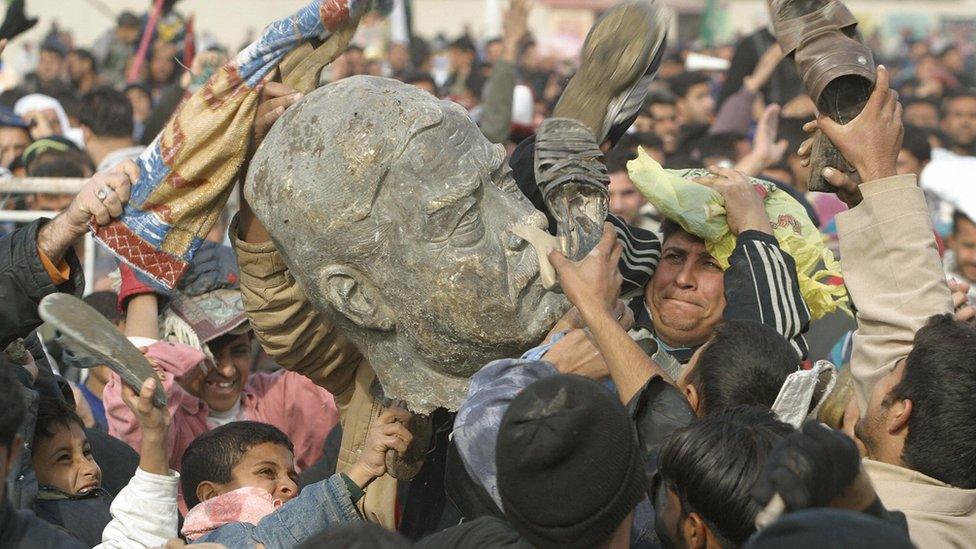
The fall of Saddam Hussein was one of the stated aims of military action
Former Defence Secretary John Reid, who took up office two years after the invasion, told the Iraq Inquiry that the US focus had been on the invasion, external and "they weren't thinking of nation building".
The Department for International Development is expected to be criticised.
Former defence chief Lord Boyce has claimed, external that UK development experts were told to sit in their tents and "not do anything" in the aftermath of the war.
He told the Iraq inquiry that soldiers did much of the reconstruction, with the international development department "particularly uncooperative".
They were not sure the Iraqis "were poor enough to deserve aid", he said.
Clare Short, then international development secretary in Tony Blair's government, resigned in May 2003 in protest at planning for the war's aftermath.
She has said Tony Blair had promised the UN, external a strong role in Iraq's reconstruction.
In a BBC documentary British envoy to Iraq, Sir Jeremy Greenstock, said no-one had focused on the long-term security of Iraq.
"There was a vacuum from the beginning into which looters, saboteurs, the criminals, the insurgents moved very quickly," he said.
Mr Blair told the BBC he disagreed, external, saying: "I don't think we should be apologising because we're not causing the terrorism."